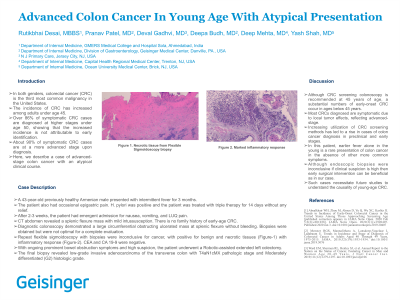Monday Poster Session
Category: Colorectal Cancer Prevention
P1789 - Advanced Colon Cancer in Young Age With Atypical Presentation
Monday, October 23, 2023
10:30 AM - 4:15 PM PT
Location: Exhibit Hall

Has Audio
.jpg)
Pranav Patel, MD
Geisinger Medical Center
Danville, PA
Presenting Author(s)
Rutikbhai Desai, MBBS1, Pranav Patel, MD2, Devalben Gadhvi, MD3, Deepa Budh, MD4, Deep Mehta, MD5, Yash Shah, MD6
1GMERS Medical College, Jersey City, NJ; 2Geisinger Medical Center, Danville, PA; 3NJ Primary Care, Jersey City, NJ; 4St. Barnabas Hospital, Bronx, NY; 5Capital Health Regional Medical Center, Trenton, NJ; 6Ocean University Medical Center, Aberdeen, NJ
Introduction: In both genders, colorectal cancer (CRC) is the third most common malignancy in the United States. The incidence of CRC has increased among adults under age 45. Over 86% of symptomatic CRC cases are diagnosed at higher stages under age 50, showing that the increased incidence is not attributable to early identification. About 90% of symptomatic CRC cases are at a more advanced stage upon diagnosis. Here, we describe a case of advanced-stage colon cancer with an atypical clinical course.
Case Description/Methods: A 43-year-old previously healthy Armenian male presented with intermittent fever for 3 months. The patient also had occasional epigastric pain. H. pylori was positive and the patient was treated with triple therapy for 14 days without any relief. After 2-3 weeks, the patient had emergent admission for nausea, vomiting, and LUQ pain. CT abdomen revealed a splenic flexure mass with mild intussusception. There is no family history of early-age CRC. Diagnostic colonoscopy demonstrated a large circumferential obstructing ulcerated mass at splenic flexure without bleeding. Biopsies were obtained but were not optimal for a complete evaluation. Repeat flexible sigmoidoscopy with biopsies were inconclusive for cancer, with positive for benign and necrotic tissues. CEA and CA 19-9 were negative. With ongoing prominent bowel obstruction symptoms and high suspicion, the patient underwent a Robotic-assisted extended left colectomy. The final biopsy revealed low-grade invasive adenocarcinoma of the transverse colon with T4aN1cMX pathologic stage and Moderately differentiated (G2) histologic grade.
Discussion: Although CRC screening colonoscopy is recommended at 45 years of age, a substantial numbers of early-onset CRC occur in ages below 45 years. Most CRCs diagnosed are symptomatic due to local tumor effects, reflecting advanced-stage. Increasing utilization of CRC screening methods has led to a rise in cases of colon cancer diagnosis in preclinical and early stages. In this patient, earlier fever alone in the young is a rare presentation of colon cancer in the absence of other more common symptoms. Although endoscopic biopsies were inconclusive if clinical suspicion is high then early surgical intervention can be beneficial as in our case. Such cases necessitate future studies to understand the causality of young-age CRC.
Disclosures:
Rutikbhai Desai, MBBS1, Pranav Patel, MD2, Devalben Gadhvi, MD3, Deepa Budh, MD4, Deep Mehta, MD5, Yash Shah, MD6. P1789 - Advanced Colon Cancer in Young Age With Atypical Presentation, ACG 2023 Annual Scientific Meeting Abstracts. Vancouver, BC, Canada: American College of Gastroenterology.
1GMERS Medical College, Jersey City, NJ; 2Geisinger Medical Center, Danville, PA; 3NJ Primary Care, Jersey City, NJ; 4St. Barnabas Hospital, Bronx, NY; 5Capital Health Regional Medical Center, Trenton, NJ; 6Ocean University Medical Center, Aberdeen, NJ
Introduction: In both genders, colorectal cancer (CRC) is the third most common malignancy in the United States. The incidence of CRC has increased among adults under age 45. Over 86% of symptomatic CRC cases are diagnosed at higher stages under age 50, showing that the increased incidence is not attributable to early identification. About 90% of symptomatic CRC cases are at a more advanced stage upon diagnosis. Here, we describe a case of advanced-stage colon cancer with an atypical clinical course.
Case Description/Methods: A 43-year-old previously healthy Armenian male presented with intermittent fever for 3 months. The patient also had occasional epigastric pain. H. pylori was positive and the patient was treated with triple therapy for 14 days without any relief. After 2-3 weeks, the patient had emergent admission for nausea, vomiting, and LUQ pain. CT abdomen revealed a splenic flexure mass with mild intussusception. There is no family history of early-age CRC. Diagnostic colonoscopy demonstrated a large circumferential obstructing ulcerated mass at splenic flexure without bleeding. Biopsies were obtained but were not optimal for a complete evaluation. Repeat flexible sigmoidoscopy with biopsies were inconclusive for cancer, with positive for benign and necrotic tissues. CEA and CA 19-9 were negative. With ongoing prominent bowel obstruction symptoms and high suspicion, the patient underwent a Robotic-assisted extended left colectomy. The final biopsy revealed low-grade invasive adenocarcinoma of the transverse colon with T4aN1cMX pathologic stage and Moderately differentiated (G2) histologic grade.
Discussion: Although CRC screening colonoscopy is recommended at 45 years of age, a substantial numbers of early-onset CRC occur in ages below 45 years. Most CRCs diagnosed are symptomatic due to local tumor effects, reflecting advanced-stage. Increasing utilization of CRC screening methods has led to a rise in cases of colon cancer diagnosis in preclinical and early stages. In this patient, earlier fever alone in the young is a rare presentation of colon cancer in the absence of other more common symptoms. Although endoscopic biopsies were inconclusive if clinical suspicion is high then early surgical intervention can be beneficial as in our case. Such cases necessitate future studies to understand the causality of young-age CRC.
Disclosures:
Rutikbhai Desai indicated no relevant financial relationships.
Pranav Patel indicated no relevant financial relationships.
Devalben Gadhvi indicated no relevant financial relationships.
Deepa Budh indicated no relevant financial relationships.
Deep Mehta indicated no relevant financial relationships.
Yash Shah indicated no relevant financial relationships.
Rutikbhai Desai, MBBS1, Pranav Patel, MD2, Devalben Gadhvi, MD3, Deepa Budh, MD4, Deep Mehta, MD5, Yash Shah, MD6. P1789 - Advanced Colon Cancer in Young Age With Atypical Presentation, ACG 2023 Annual Scientific Meeting Abstracts. Vancouver, BC, Canada: American College of Gastroenterology.
